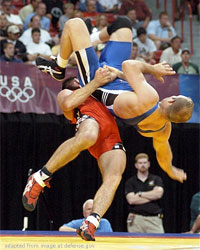Russia Fights to Put Wrestling Back on the Olympic Mat

(Moscow Times – themoscowtimes.com – Ivan Nechepurenko – Februry 14, 2013)
Hours after the International Olympic Committee’s Tuesday decision to remove wrestling from the Summer Games after 2016, Russia threw its full weight behind a campaign to bring the sport back.
Russian Olympic Committee chief Alexander Zhukov a State Duma Vice Speaker and the country’s top Olympic official emphasized in an appeal to the IOC that “wrestling is not only important for Russian athletics and the millions of children who practice it, but also to the whole Olympic movement.”
Many prominent Russian athletes said they were shocked by the removal of both freestyle and Greco-Roman versions of the sport. The decision was reportedly based on more than three dozen criteria, including television ratings, ticket sales and global popularity. Twenty-five other sports were reviewed. Wrestling’s elimination will enable a different sport to be placed in the 2020 program.
Abakar Abakarov, head of the Dagestan republic’s Khasavyurt Wrestling Olympic Reserve School, told The Moscow Times that “this will be a big blow” to his region. “Thousands of children will not be able to find themselves in other sports and be left on the street. Who knows what they will do there?”
Some 8,000 children currently attend wrestling schools in Khasavyurt alone, Abakarov said. His school in particular prepared two-time Olympic champion Mavlet Batirov, who won at the 2004 and 2008 games in the 55- and 60-kilogram freestyle classes, respectively.
Wrestling is one of the most popular sports in the Russian Caucasus. Chechnya and Dagestan have made an impressive contribution to the country’s Olympic medal count. In the past four Summer Olympics, wrestlers from Khasavyurt alone won eight gold medals in freestyle wrestling.
With Russia consistently making a strong showing in the sport, some commentators believe that the IOC’s decision was politically motivated.
Alexander Karelin, widely considered the greatest Greco-Roman wrestler of all time, told the Ves Sport news agency that it was “the dominance of Russian wrestlers and [international wrestling association] FILA’s position that have influenced this decision, which makes a detrimental impact on the Olympic foundation.”
Ali Ismailov, coach of the national youth wrestling team, at the same time pointed out that the “last Olympics have shown that winners come from different countries, such as Japan, Iran and the United States.” Nevertheless, he still believed that “people in the Caucasus will be disadvantaged.”
Russian Wrestling Federation chief Mikhail Mamiashvili was too busy to comment. When his office was reached by phone, his press attache said he had spent all Tuesday at the presidential administration discussing the issue and, later that evening, was scheduled to fly to Phuket, Thailand, for a FILA meeting.
Wrestling, which made its Olympic debut in 708 B.C., will in May be considered for placement on an IOC shortlist of sports vying for inclusion in the 2020 Olympic program. A final decision whether to include baseball/softball, karate, roller sports, climbing, squash, wakeboarding, wushu and possibly wrestling will be made in September 2013 at the IOC’s 125th session.
Russian Olympic Committee Honorary President Vitaly Smirnov was reasonably optimistic about wrestling’s future in the games. He told the Sovietsky Sport newspaper that “wrestling has every chance of getting back on the Olympic roster.”
